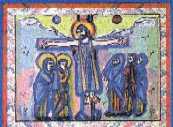|
TIME |
| Psalm 90: 4, 9-10,
12, 15: "For a thousand years in your sight are like a day that has just gone by, or
like a watch in the night. [. . .] All our days pass away under your wrath; we finish our
years with a moan. The length of our days is seventy years -- or eighty, if we have
the strength; yet their span is but trouble and sorrow, for they quickly pass, and we fly
away. [. . .] Teach us to number our days aright that we may gain a heart of wisdom. [. .
.] Make us glad for as many days as you have afflicted us, for as many years as we have
seen trouble." Ecclesiastes 3:1,12 : "For everything there is a season, and a time for every matter under heaven... He has made everything suitable for its time, moreover he has put a sense of past and future into their minds." I Timothy 1:17: "Now to the King eternal, immortal, invisible, the only God, be honor and glory for ever and ever. Amen." |
|
| Every moment of our temporal lives is lived within the eternity of God. Indeed, it is God's everlasting nature that makes time itself possible. The succession of events, every time recalled, forgotten, rehashed, relished, or regretted, exists because God has given us the gift of time. As such, our lives, birth to death, joy and sorrow, have a meaningful pattern. They move within the continuum God has given us to experience. They are sometimes hard to endure, sometimes pleasant to share, but they are always large in their importance. There are no small stories. Equally, God's gift of time establishes the patterns of life, its rhythm, and its dance. Our heart beats in our chest and our blood courses through our bodies because we exist in motion, moving from the past through to the future. This suggests that two very important literary elements in art have their most basic source in God's design: narrative plot and verbal rhythms. When we tell stories, we are reflecting God's design for us. When we lovingly taste the cadence of words, when we feel their ebb and flow in speech, when we sense in both poetry and prose their innate music, we know a little better God as the Lord of the Dance, as the Master of Time. As such, stories and poems remind us that God calls us to patience, that there are some gifts that can only be given, some skills that can only be obtained, over a period of time. We are to live in God's kairos, his own eternal time, his own plan for the unfolding of history, and this calls us to reject the world's standard chronos time when it tempts us to live as if God doesn't exist. Patience is the virtue that teaches us this. A story or poem will often not unfold its wisdom or delight without a well-told development that expands as it goes. Their gifts exist in time. Story and poetry are part of being fully human, for we are creatures of time. They are part of what God has made us to be. * * * * * Central Insight: Plot and verbal rhythm have their source in God's creation of time. When we spend time learning something, we can cooperate with God's lessons in patience. Suggestions for Application: Choose examples of plot or language to illustrate this principle. |
|
